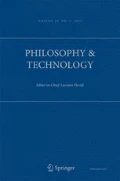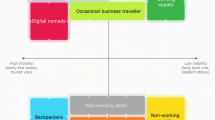Abstract
This special issue fosters joint exploration of personal identity by both philosophers, on the one hand, and scholars and researchers in Internet Studies (IS), on the other. The summary of articles gathered here leads to a larger collective account of personal identity that highlights embodiment and thereby the continuities between online and offline senses and experiences of selfhood. I connect this collective account with other contemporary works at the intersections between philosophy and IS, such as on trust and virtual worlds, thereby entailing further questions and debates. I close by exploring how these collective insights illuminate larger themes regarding technology—specifically, the debate between a distinctively modern Augustinian–Cartesian account emphasizing control, liberation, and immortality by way of escape from the body, vs. more contemporary alternatives in feminist, environmental, and information philosophies that highlight autonomy through, rather than against, embodiment.
Similar content being viewed by others
References
Baron, N. (2008). Always on: language in an online and mobile world. Oxford: Oxford University Press.
Baym, N. (2011). Social networks 2.0. In M. Consalvo & C. Ess (Eds.), The handbook of internet studies (pp. 384–405). Oxford: Wiley-Blackwell.
Bromseth, J., & Sundén, J. (2011). Queering internet studies: intersections of gender and sexuality. In M. Consalvo & C. Ess (Eds.), The handbook of internet studies (pp. 270–299). Oxford: Blackwell.
Cheong, P. H., Fischer-Nielsen, P., Gelfgren, S., Ess, C. (2012). Digital religion: Social media and culture: Perspectives, practices and futures. New York: Peter Lang.
Consalvo, M., & Ess, C. (2011). The handbook of internet studies. Oxford: Wiley-Blackwell.
Descartes, R. [1637) (1972). Discourse on method. The Philosophical Works of Descartes, E. S. Haldane and G.R.T. Ross (trans.), volume I. Cambridge: Cambridge University Press, 1972.
Dibbell, J. (1993). A rape in cyberspace or how an evil clown, a Haitian trickster spirit, two wizards, and a cast of dozens turned a database into a society. The Village Voice, December 21, 36–42.
Ess, C. (2004). Beyond Contemptus Mundi and Cartesian dualism: Western resurrection of the bodysubject and (re)new(ed) coherencies with eastern approaches to life/death. In G. Wollfahrt & H. Georg-Moeller (Eds.), Philosophie des Todes: death philosophy east and west (pp. 15–36). Munich: Chora Verlag.
Ess, C. (2008). Culture and global networks: hope for a global ethics? In J. van den Hoven & J. Weckert (Eds.), Information technology and moral philosophy (pp. 195–225). Cambridge: Cambridge University Press.
Ess, C. (2009). Floridi's philosophy of information and information ethics: current perspectives, future directions. The Information Society, 25, 159–168.
Ess, C. (2010). The embodied self in a digital age: possibilities, risks, and prospects for a pluralistic (democratic/liberal) future? Nordicom Information, 32(2), 105–118.
Ess, C. (2011). Self, community, and ethics in digital mediatized worlds. In C. Ess & M. Thorseth (Eds.), Trust and virtual worlds: Contemporary perspectives (pp. 3–30). Oxford: Peter Lang.
Ess, C. (2012). Ethics at the boundaries of the virtual. In M. Grimshaw (Ed.), Oxford handbook of virtuality. Oxford: Oxford University Press (In press).
Ess, C., & Consalvo, M. (2011). What is “internet studies”? (Introduction). In M. Consalvo & C. Ess (Eds.), The handbook of internet studies (pp. 1–7). Oxford: Wiley-Blackwell.
Ess, C. and Dutton, W. (2012). Internet studies: perspectives on a rapidly developing field. Introduction to special issue of new media and society, “Internet Studies: State(s) of the Art(s).” (In press)
Ess, C., & Thorseth, M. (2011). Introduction. In C. Ess & M. Thorseth (Eds.), Trust and virtual worlds: contemporary perspectives (pp. vii–xxix). Oxford: Peter Lang.
Floridi, L. (2010). Information—a very short introduction. Oxford: Oxford University Press.
Floridi, L. (2011). The philosophy of information. Oxford: Oxford University Press.
Floridi, L. (2012). Information ethics. Oxford: Oxford University Press (in press).
Foucault, M. (1988). Technologies of the self. In L. H. Martin, H. Gutman, & P. Hutton (Eds.), Technologies of the self: a seminar with Michel Foucault (pp. 16–49). Amherst: The University of Massachusetts Press.
Fuchs, C. (2011). An alternative view of privacy on Facebook. Information, 2(1), 140–165.
Kurzweil, R. (2001). The Web within us: minds and machines become one. At: http://www.kurzweilai.net/the-web-within-us-minds-and-machines-become-one. Accessed 26 July 2012.
Leopold, A. (1949). A sand county Almanac. New York: Oxford University Press.
Livingstone, S. (2011). Internet, children, and youth. In M. Consalvo & C. Ess (Eds.), The handbook of internet studies (pp. 348–368). Oxford: Wiley-Blackwell.
Locke, J. [1690] (1982) An essay concerning the true original, extent and end of civil government [second treatise], Richard Cox (ed.), Arlington Heights, IL: Harlan Davidson.
Manning, R. (1992). Speaking from the heart: a feminist perspective on ethics. Baltimore: Rowman and Littlefield.
Moravec, H. (1988). Mind children: the future of robot and human intelligence. Cambridge: Harvard University Press.
Ong, W. (1988). Orality and literacy: the technologizing of the word. London: Routledge.
Parfit, D. (1984). Reasons and persons. Oxford: Oxford University Press.
Simmel, G. (1910). Sociability. In D. N. Levine (Ed.), Georg Simmel. On individuality and social forms. Selected writings (pp. 127–140). Chicago: The University of Chicago Press.
Simmel, G. (1955). Conflict and the web of group-affiliations. New York: The Free Press.
Stolow, J. (2011). Telegraph. At: http://freq.uenci.es/2011/09/07/telegraph/. Accessed 26 July 2012.
Stone, A. R. (1991). Will the real body please stand up? Boundary stories about virtual cultures. In M. Benedikt (Ed.), Cyberspace: first steps (pp. 81–118). Cambridge: MIT Press.
Turkle, S. (1995). Life on the screen: identity in the age of the internet. New York: Simon & Schuster.
Van Gelder, L. ([1985] 1991). The strange case of the electronic lover. In C. Dunlop and R. Kling (eds.), Computerization and controversy, 364–375. San Diego: Academic Press, 1991. (Originally published in: Ms. Magazine, October 1985, pp. 94–124.).
Zuckerman, P. (2008). Society without God: what the least religious nations can tell us about contentment. New York: New York University Press.
Acknowledgments
I wish to express my great gratitude to the sponsors of the 2010 Aarhus workshop, namely the AHRC, the Department of Philosophy and History of Ideas, and the Information and Media Studies Department, Aarhus University. My colleagues Raffaele Rodogno and Johanna Seibt not only contributed their philosophical insights and acumen to the workshop itself, but also helped substantially with the planning and logistics. In addition to the participants, I would also like to thank our two keynote speakers, Maria Bakardjieva (University of Calgary, Canada) and Soraj Hongladarom (Chulalongkorn University, Bangkok, Thailand), for offering workshop participants both new insights and critical but cordial commentary.
Author information
Authors and Affiliations
Corresponding author
Rights and permissions
About this article
Cite this article
Ess, C. At the Intersections Between Internet Studies and Philosophy: “Who Am I Online?”. Philos. Technol. 25, 275–284 (2012). https://doi.org/10.1007/s13347-012-0085-4
Received:
Accepted:
Published:
Issue Date:
DOI: https://doi.org/10.1007/s13347-012-0085-4



